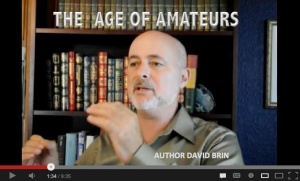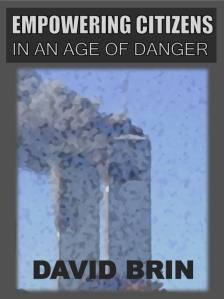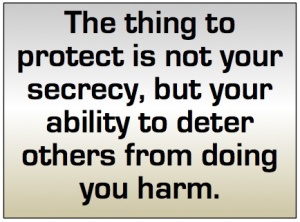And yet - just as clearly - this trend cannot continue much longer. If only for demographic reasons, the as the rate of professionalization and specialization must start to fall off, exactly as we are about to face a bewildering array of new -- and rapid-onrushing -- problems.
How will we cope?
 Elsewhere I speak of the 21st Century as a looming "Age of Amateurs," wherein a highly educated citizenry will be able to adeptly bring to bear countless capabilities and individual pools of knowledge, some of which may not be up to professional standards, but that can find synergy together, perhaps augmenting society's skill set, at a time of need. We saw this very thing happen at the century's dawn, on 9/11. Most important, helpful and successful actions that occurred on an awful day were taken by self-mobilized citizens and amateurs. At a moment when professionalism failed at many levels.
Elsewhere I speak of the 21st Century as a looming "Age of Amateurs," wherein a highly educated citizenry will be able to adeptly bring to bear countless capabilities and individual pools of knowledge, some of which may not be up to professional standards, but that can find synergy together, perhaps augmenting society's skill set, at a time of need. We saw this very thing happen at the century's dawn, on 9/11. Most important, helpful and successful actions that occurred on an awful day were taken by self-mobilized citizens and amateurs. At a moment when professionalism failed at many levels.
It is important to note what a strong role technology played in fostering citizen action on 9/11. People equipped with video cameras documented the day and provided our best post-mortem footage. People with cell phones organized the evacuation of the twin towers. Similar phone-stirred gumption stirred and empowered the heroes who fought back and made the Legend of Flight UA 93. A phenomenon that noted author Rebecca Solnit later documented in A Paradise Built in Hell: The Extraordinary Communities that Arise in Disaster.
 In sharp contrast, the events of Hurricane Katrina (and the 2011 earthquake-tsunami in Japan) showed the dark side of this transition -- a professional protector caste (crossing party and jurisdiction lines: including republicans and democrats, state, local and federal officials) whose sole ambition appeared to be to limit citizen-organized activity. Moreover, the very same technology that empowered New Yorkers and Bostonians betrayed citizens in New Orleans. Thousands who had fully-charged and operational radios in their pockets were unable to use them for communication -- either with each other or the outside world -- thanks to collapse of the cellular phone networks.
In sharp contrast, the events of Hurricane Katrina (and the 2011 earthquake-tsunami in Japan) showed the dark side of this transition -- a professional protector caste (crossing party and jurisdiction lines: including republicans and democrats, state, local and federal officials) whose sole ambition appeared to be to limit citizen-organized activity. Moreover, the very same technology that empowered New Yorkers and Bostonians betrayed citizens in New Orleans. Thousands who had fully-charged and operational radios in their pockets were unable to use them for communication -- either with each other or the outside world -- thanks to collapse of the cellular phone networks.
This was a travesty. But the aftermath was worse! Because, amid all the finger-pointing and blame-casting that followed Katrina, almost no attention has been paid to improving the reliability and utility of our cell networks, to assist citizen action during times of emergency. To the best of my knowledge. no high level demand has gone out - from FEMA or any other agency - for industry to address problems revealed in the devastation of America's Gulf Coast. A correction that should be both simple/cheap and useful to implement.
What do we need? We must have new ways for citizens to self-organize, both in normal life and (especially) during crises, when normal channels may collapse, or else get taken over by the authorities for their own use. All this might require is a slight change -- or set of additions -- in the programming of the sophisticated little radio communications devices that we all carry in our pockets, nowadays.
How about a simple back-up mode for text messaging? One that could use packet-switching to bypass the cell towers when they are down, and pass messages from phone to phone -- or peer-to-peer -- at least among phones that are of the same type? (GSM, TDMA, CDMA etc.) All of the needed packet-switching algorithms already exist. Moreover, this would allow a drowning city (or other catastrophe zone) to fill with tens of thousands of little spots of light, supplying information to helpers and reassurance to loved ones, anywhere in the world.
Are the cell companies afraid their towers will be bypassed when there's no emergency? What foolishness. This mode could be suppressed when a good tower is in range and become useful automatically when one is not... a notion that also happens to help solve the infamous "last mile connectivity problem." Anyway, there are dozens of ways that p2p calls could be billed. Can we at least talk about it?
(Late note: as of 2012, it seems that at long last some efforts are being made in this area, by Qualcomm and some other companies. Stay tuned -- so to speak.)
The same dismal intransigence foils progress on the internet, where millions of adults use "asynchronous" communications methods, like web sites, blogs and email, but shun "synchronous" zones like chat and avatar worlds, where the interface (filled with sexy cartoon figures) seem designed to ruin any chance of useful discourse. For example, by limiting self-expression to about a sentence at a time and ignoring several dozen ways that human beings actually organize and allocate scarce attention in real life. To answer your next question: Facebook is quasi synchronous for those folks who haunt it almost incessantly. It thus acquires most of the worst traits of both worlds.
 When someone actually pays attention to this "real digital divide" - between the lobotomized/childish synchronous chat/avatar/facebook world and the slow-but-cogent asynchronous web/blog/download world -- we may progress toward useful online communities like rapid "smart mobs."
When someone actually pays attention to this "real digital divide" - between the lobotomized/childish synchronous chat/avatar/facebook world and the slow-but-cogent asynchronous web/blog/download world -- we may progress toward useful online communities like rapid "smart mobs." For example, crowd-sourcing and citizen engagement are increasingly playing a role in science -- both in terms of funding and direct participation in research.
Only first, we are going to have to learn to look at how human beings allocate attention in real life! (For more on this: see EpoceneChat)
Another tool involves Disputation Arenas, using conflict and competition to help resolve issues and achieve mediation, consensus or synthesis.
Oh, there are dozens of other technologies that will add together, like pieces in a puzzle, synergizing to help empower the magnificent citizen of tomorrow. Facial recognition systems and automatic lookups will turn every pedestrian on any street into someone who you vaguely know... a prospect that cynical pundits will decry, but that was EXACTLY how our ancestors lived, nearly all of them, throughout human history. The thing to be afraid of is asymmetries of power, not universal knowledge. The thing to protect is not  your secrecy, but your ability to deter others from doing you harm.
your secrecy, but your ability to deter others from doing you harm.
 your secrecy, but your ability to deter others from doing you harm.
your secrecy, but your ability to deter others from doing you harm.
Likewise, I assure you that we are on the verge of getting both lie detectors and reliable personality profiling. And yes, if these new machines frighten you, they should! Because they may wind up being clutched and monopolized by elites, and then used against us. I am glad you're frightened. If that happens, we will surely see an era that makes Big Brother look tame.
And yet, the solution to this danger is not to "ban" such technologies! That is exactly what elites want us to do (so they can monopolize the methods in secret out of our skeptical eye). No, that reflex sees only half the story. Come on, open your mind a little farther.
What if those very same -- inevitable -- technologies wind up being used by all sovereign citizens of an open democracy, say, fiercely applied to politicians and others who now smile and croon and insist that they deserve our trust? In other words, what if we could separate the men and women who have told little lies and admit it (and we forgive them) from those who tell the really dangerous and destructive whoppers? Those who are corrupt and/or blackmailed and/or lying through their teeth?
In that case, won't we have a better chance of making sure that Big Brother doesn't happen... ever?
 Oh, it is a brave new world... We will have to be agile. Some things will be lost and others diminished. We will have to re-define "privacy" much closer to home, or even just within it.
Oh, it is a brave new world... We will have to be agile. Some things will be lost and others diminished. We will have to re-define "privacy" much closer to home, or even just within it.
On the other hand, if we don't panic, we may see the beginnings of the era of the sovereign and empowered citizen. An Age of Amateurs in which no talent is suppressed or wasted, and no problem escapes the attention of a myriad talented eyes.
===== ===== =====
See more on Citizen Involvement in Emergency Preparedness





